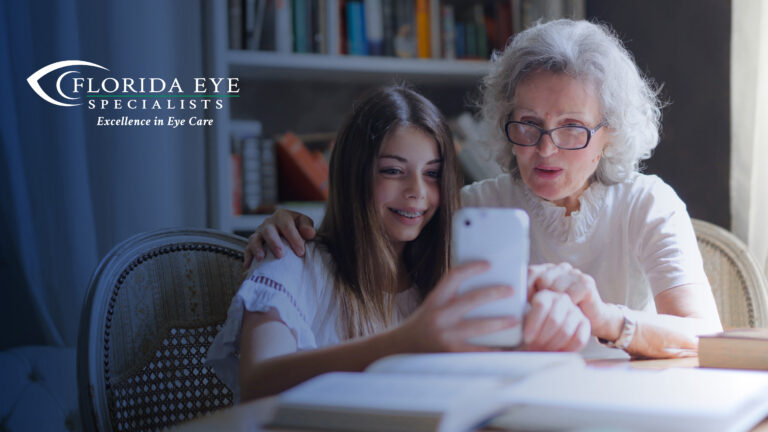Most eye conditions can affect anyone, but those ages 60 and older are most at risk. Age-related eye conditions like macular degeneration, glaucoma, and cataracts can cause severe vision loss and blindness. Unfortunately, patients often don’t notice the signs before vision loss occurs, making annual eye exams crucial to diagnose conditions early and preserve vision which is why you need to know these things.
Watch for symptoms of the following conditions and consult your eye doctor if you have questions.
Glaucoma
Glaucoma is one of the most common degenerative eye conditions. There are several different types of glaucoma, but they are all generally caused by pressure buildup due to fluid in the eye. Known as the “silent thief of sight,” you often won’t notice any symptoms of glaucoma, but it can eventually lead to permanent vision loss.
Regular eye exams are needed to catch this condition early and begin proper treatment, including eye drops or eye surgery to relieve pressure inside the eye.
Cataracts
Cataracts are a clouding of your eye’s natural lens, and they can begin to develop in your 40s and 50s. You may start to notice symptoms such as:
- Blurred vision
- Sensitivity to light and glare
- Poor night vision
- A fading or yellowing of colors.
The good news is that cataract surgery is a quick and safe procedure to help you see clearly again — in fact, many patients see better after cataract surgery than ever before. That’s thanks to advances in technology like laser cataract surgery and premium cataract lens implants.
One of the newest options, the Light Adjustable Lens™, allows you to adjust your prescription after surgery, just like glasses or contacts.
How Long Does Cataract Surgery Take?
Cataract surgery is one of the most common and safest surgeries in medicine. It takes only 30–45 minutes or less. Patients go home the same day as their procedure. If you need cataract surgery in both eyes, you will undergo two separate operations. Our surgeons like the first eye to recover before they operate on the second.
How Long Between Cataract Surgery On Each Eye?
Your doctor will schedule your cataract surgeries for each eye based on each patient’s needs. Some patients will wait as little as one week between surgeries. Others will wait 4–6 weeks or longer to get cataract surgery in the other eye, depending on eye health and symptom severity.
How Long After Cataract Surgery Can You Bend Over?
Regarding restrictions after cataract surgery, the most important thing to remember is that you will need someone to drive you home. If someone you know is not available, our Cataract Consultant can help make arrangements for you to have a safe ride home. Avoid driving for one to two days after the procedure while your eye heals.
Patients should also avoid bending over, strenuous exercise, or lifting objects heavier than five pounds for the first week after surgery. Patients are advised to sleep on the opposite side of their healing eye to avoid pressure and shorten the healing process.
Dry Eye
Dry eye occurs because the eye’s tear glands do not produce enough moisture. Symptoms can range from itching and redness to painful burning. In some extreme cases, dry eye can even lead to vision loss when untreated. There are a wide variety of dry eye treatment options for every specific case, including:
- Artificial tears and gels
- Medicated eye drops
- Lipiflow thermal pulsation
- ProKera therapeutic device
- Plugs to block the drain to allow more tears to bathe the eye
- Anti-inflammatory drops, and more.
Diabetic Retinopathy
Diabetic retinopathy is a complication of diabetes that can cause vision problems. Excessive sugar in your blood, also known as blood glucose, can damage blood vessels in your eyes, causing symptoms like eye floaters, blurred vision, and vision loss. If you have diabetes or are at risk, it’s important to receive regular screenings for this condition.
Macular Degeneration
Macular degeneration is the most common cause of age-related vision loss. This retinal disease occurs when the center of the retina begins to deteriorate and causes symptoms like blurred or distorted vision, blind spots, reduced central vision, and difficulty adapting to low light levels. If untreated, this condition can lead to blindness.
Thankfully, treatments like medications and eye injections can help relieve symptoms and stall its progression.
Don’t Skip Your Annual Eye Exam
Getting a regular eye exam is good practice for people of all ages, but it is essential for patients ages 60 and older. At Florida Eye Specialists, our dedicated team of eye doctors has helped thousands of patients in the Jacksonville area improve their vision and detect serious conditions in the early stages. Schedule your comprehensive exam today and protect your sight for years to come.

